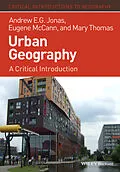Urban Geography a comprehensive introduction to a variety of issues relating to contemporary urban geography, including patterns and processes of urbanization, urban development, urban planning, and life experiences in modern cities.
* Reveals both the diversity of ordinary urban geographies and the networks, flows and relations which increasingly connect cities and urban spaces at the global scale
* Uses the city as a lens for proposing and developing critical concepts which show how wider social processes, relations, and power structures are changing
* Considers the experiences, lives, practices, struggles, and words of ordinary urban residents and marginalized social groups rather than exclusively those of urban elites
* Shows readers how to develop critical perspectives on dominant neoliberal representations of the city and explore the great diversity of urban worlds
Autorentext
Andrew E.G. Jonas holds a Chair in Human Geography at the University of Hull in the UK. His co-edited books include The Urban Growth Machine; Critical Perspectives Two Decades Later (1999, with David Wilson), Interrogating Alterity (2010, with Duncan Fuller and Roger Lee), and Territory, the State and Urban Politics (2012, with Andy Wood). He serves on the editorial boards of Urban Geography and Territory Politics and Governance.
Eugene McCann is a Professor of Geography at Simon Fraser University, Burnaby, British Columbia, Canada. He is co-editor, with Kevin Ward, of Mobile Urbanism: Cities & Policymaking in the Global Age (2011) and, with Ronan Paddison, Cities & Social Change: Encounters with Contemporary Urbanism (2014).
Mary Thomas is Associate Professor in Women's, Gender and Sexuality Studies at Ohio State University. She is the author of Multicultural Girlhood: Racism, Sexuality, and the Conflicted Spaces of American Education (2011), and co-editor of A Companion to Social Geography (2011).Klappentext
Urban Geography presents a comprehensive introduction to a wide range of critical themes and conceptual ideas relating to contemporary urban geography including patterns and processes of urbanization, urban development, urban planning, and life experiences in modern cities. Building upon a wide range of topical examples and illustrative case studies from several international cities, the text brings to light all of the key ideas, concepts, and themes most widely utilized in critical geographical approaches to contemporary urban spaces.
Initial chapters offer an introduction to critical approaches to the city before exploring the evolution of contemporary global processes of urbanization and urban development. These are followed by more in-depth coverage of such topics as labor, planning, place marketing, social reproduction, nature, experience, art, culture, citizenship, and alternative urban spaces. Individual chapters strike a careful balance between a depiction of the diversity of ordinary urban geographies and an exposure of the networks, flows, and relations which increasingly connect cities and urban spaces at the global level.
Urban Geography offers valuable insights into critical geographical approaches to the modern city, along with the diverse set of policies, practices, and challenges of contemporary urban living and its rapid movements and changes.This book's cover shows the Ashton Canal dissecting the formerly industrial area of Ancoats in Manchester, England. Urban landscapes like this one are palimpsests that speak to how cities change in tandem with social, economic, and architectural transformations over time. A heartland of 19th Century urban industrialism, Ancoats is now rebranded as 'New Islington' and, as the contemporary apartment buildings along the canal suggest, is undergoing gentrification. Cities are always changing. This book explains how, why, where, and in whose interests.
Zusammenfassung
Urban Geography a comprehensive introduction to a variety of issues relating to contemporary urban geography, including patterns and processes of urbanization, urban development, urban planning, and life experiences in modern cities.
- Reveals both the diversity of ordinary urban geographies and the networks, flows and relations which increasingly connect cities and urban spaces at the global scale
- Uses the city as a lens for proposing and developing critical concepts which show how wider social processes, relations, and power structures are changing
- Considers the experiences, lives, practices, struggles, and words of ordinary urban residents and marginalized social groups rather than exclusively those of urban elites
- Shows readers how to develop critical perspectives on dominant neoliberal representations of the city and explore the great diversity of urban worlds
Inhalt
List of Figures vii
List of Tables xi
List of Boxes xii
Acknowledgments xiv
Preface xvi
1 Approaching the City 1
2 Cities for Whom? The Contours and Commitments of Critical Urban Geography 27
3 Production, Economy, and the City 53
4 A World of Cities 77
5 Labor and the City 100
6 The City and Social Reproduction 122
7 Governing the City: The State, Urban Planning, and Politics 141
8 Experiencing Cities 162
9 Molding and Marketing the Image of the City 184
10 Nature and Environment in the City 206
11 Urban Arts and Visual Cultures 229
12 Alternative Urban Spaces and Politics 252
13 Urban Crises 274
14 Epilogue: Critical Urban Geographies and Their Futures 299
Glossary 307
References 325
Index 347
